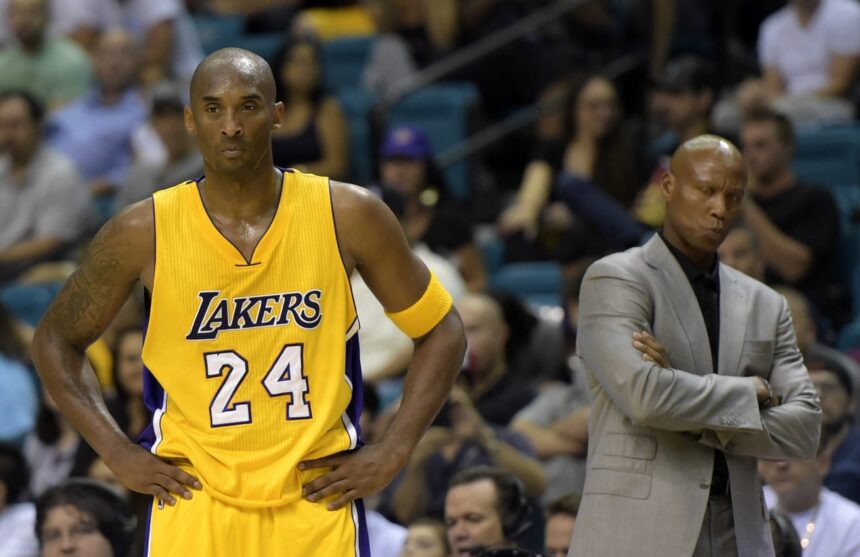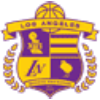Not long after Byron Scott took over coaching duties for the Los Angeles Lakers, I found myself staring at a bus bench on Exposition Boulevard near Sepulveda emblazoned with the benign greeting, “Welcome Home, Byron.” Someone — a local businessperson, civic leader, or eccentric billionaire with a preference for mid-range jumpers — paid real American currency to extend the hand of friendship to a coach many basketball pundits outside of L.A. had been ridiculing as an out-of-touch, miserly old man stemming from his years of struggle in New Orleans and Cleveland. Of course, Laker fans are an optimistic bunch, and for good reason — the lucky recipients of 11 world championships since the move from Minneapolis and a steady pipeline of Hall of Fame players has made us the envy of fans around the country. One of the major pieces of that good fortune was Byron, a Showtime Laker whose mere presence suggests the hazy analog days of jello jiggling and champagne bottles popping at the Forum. But nostalgia can undermine even the greatest franchises. The Oakland Raiders have finally found a modicum of success this season after they finally stopped screaming “JUST WIN, BABY!” at the top of their lungs every chance they got and joined the 21st century. The hated Celtics handed their team to a young genius coach who has turned a pu-pu platter of role players into a playoff team, much to my eternal chagrin. Now that the Lakers have started their second consecutive season at 0-4, it only seems fair to ask the question of whether or not this franchise is mortgaging their future to honor their legends — not just Byron, but also No. 24 himself.
The biggest knock on Byron Scott has been his aversion to the pace-and-space style of modern NBA basketball exemplified by James Harden and the Houston Rockets. Critics love to focus on comments made during the 2014 preseason when Byron dismissed the importance of the three-pointer and the analytics that showed the ways in which it was a more valuable shot than a jumper at the elbow. The narrative went that if Byron Scott would just learn to appreciate the three-pointer more, he could join the cool kids’ table and the Lakers would start winning basketball games. Well, we are four games into the season and the Lakers have attempted 128 three-pointers, a total that leads the league. It’s just that, well, they’re only shooting 28 percent from behind the arc, per ESPN. In contrast to that, the Warriors — the reigning NBA champions — have attempted 111 three-pointers and have made (wait for it) 41 percent of them. If you’re not running through the streets naked, screaming and banging your chest like the Kony 2012 guy then DO YOU EVEN LIKE BASKETBALL? The Warriors use the three the way my mother uses guilt — as a deadly weapon to be employed liberally and with great pleasure. The Lakers seem like they’re using it as a last-resort. “If you’ve got the type of shooters that can shoot it, then you’ve got to use it to your advantage. I think we have those guys,” Byron told the media last Sunday when asked about their increased use of the three-ball. Do they, though?
Let’s look at the Rockets. A Houston Rockets game can swiftly turn into an episode of The Walking Dead once James Harden decides the best offensive option available to him is to drive and either kick to an open shooter or flail his way into a shooting foul. It can be mind-numbing in its repetition and its inevitability in the same way that you know that all of your favorite characters on Walking Dead are guaranteed to have their viscera strewn about the Atlanta countryside like the streamers they drop at Staples after a win, but it works. Effective dribble penetration is the key element to the formula, because a player who can force defenses to collapse on the ball opens up shots for teammates spotting up behind the arc. It’s a strategy so logical that it makes you wonder why it took so long to implement in the Association. It could be that we’re in a unique time where ball-handlers and shooters have finally gotten to the point where they can execute these techniques effectively. Would the Rockets’ system work without James Harden? Would the Warriors be able to consistently find ways to use screens to break open uncontested threes without Steph, Klay, Draymond, and the rest?
The Lakers might not have the personnel to run a similar system, and that issue starts at the top with Byron Scott and trickles down to gunners like Nick Young, Lou Williams, and Kobe Bryant and pick-and-roll black holes like Roy Hibbert. The Lakers’ best dribble penetrators are clearly Julius Randle and Jordan Clarkson. They get to the rim, they score or they draw a foul fairly regularly. According to NBA.com stats, 95.5 percent of Jordan Clarkson’s two-point field goals are unassisted, and he’s shooting 66.7 percent from less than 5 feet away from the basket. Of those close-up looks, 90 percent are unassisted. That means he’s getting into the lane and making interior defenses work. Shouldn’t that translate to open shooters for him to kick out to, James Harden-style? It should, but the shooters he finds might not be able to convert their uncontested looks.
Per NBA.com, the Lakers are shooting a paltry 28.3 percent from three when the closest defender is 4-6 feet away (which they classify as “open”). That’s quite bad compared to the historically significant Warriors, who are shooting 36.6 percent when “open.” The Warriors are actually at 50 percent when guarded by someone 2-4 feet away. The Cavs, the East’s lone powerhouse, are shooting 39.1 percent from three when considered “open.” Kobe Bryant, who has seemingly refashioned himself into a perimeter shooter, has taken 24 three-pointers and made seven of them for a 20 percent average. From inside the arc, Kobe’s shooting only 30 percent, but he’s also closing out games for the Lakers, including close games like the season opener against the Timberwolves and Tuesday night’s loss to Denver. I’d be remiss if I didn’t admit that Kobe no longer gives this team the best chance to win when it counts the most, and his personal averages are cratering the team’s statistical output. You have to question the judgment of a coach that doesn’t see the detriment of sending Kobe Bryant out in crunch time to chuck airballs while the team’s prized draft pick, D’Angelo Russell, could benefit greatly from the experience of finishing out a tight game.
So what’s the benefit of having Byron Scott as the coach? Well, it used to be that he was considered a defensive specialist, but after four games, this Laker team is giving up a league worst 116.8 points per contest. This is after the addition of rim protector Roy Hibbert, who joined Russell on the bench at the end of the Nuggets game. In fairness, Hibbert is something of an offensive liability, so it makes a bit of sense to sit him when buckets are needed, but stops are also vital when trying to crawl back from a deficit. Hibbert’s replacement, Tarik Black, was practically begging Kenneth Faried and Danilo Gallinari to dunk on him. He did the basketball equivalent of offering up his couch to his wife’s down-on-his-luck, dirtbag ex-boyfriend, then preparing him a three-course meal every night while happily taking verbal abuse from said ex with a smile on his face.
What I’m trying to say is that Tarik Black can’t play defense. I’d like to place the blame on Byron Scott, but maybe Tarik Black just can’t play defense because he’s not good at it. Maybe Nick Young is just a streaky shooter that drags his heat checks out for longer than anyone ever should. Maybe Kobe Bryant is just done.
This Laker team is deficient in so many ways (with the bright spots of Jordan Clarkson and Julius Randle’s hot starts getting lost in the doom and gloom) that firing Byron Scott, while appealing, might not be the answer. Fan favorite candidates to replace Byron include Tom Thibodeau and Scott Brooks. Both of those coaches have intriguing resumes and flashy name value, but can you imagine Thibs trying to stay sane while watching Swaggy P attempt to guard Chris Paul (or even Jamal Crawford)? The rest of the poor man’s hair will fall out. Giving this Laker team to Thibs, the defensive genius, would be akin to asking a Michelin-starred chef to make a gourmet meal out of Gorton’s fish sticks and rubber bands. And say what you will about Byron’s play-calling ability, but at least he’s calling plays. Remember Scott Brooks was fired partially because his basketball strategy was akin to a well-timed shrug emoji. Besides, I’m not even sure peak Phil Jackson could muster these troops to respectability this season. Maybe the critics outside of L.A. were right, that this is a bad team and Byron is just a stop-gap coach until they can figure out what’s next. The only silver lining to this dreadful start is that another historically awful season could mean the Lakers keep their precious top-three protected first round pick, a bounty that would make a few more months of misery worth it.
The optimism typified by that “Welcome Home, Byron” bus stop sign is getting sucked out of Lakerland and the options we have amount to “fire a local hero and hope the fourth coach since the 2011 season can right the ship toward the tepid mediocrity enjoyed by Denver and Phoenix fans” or “tank and pray we keep our pick.” Does either option sound appealing when blinded by the gilded allure of Dr. Buss’s precious trophies? Not exactly, but the next banner won’t come until we stop looking at those Larry O’Briens (and the men who won them like Byron Scott and Kobe Bryant) and start accepting this new normal before it’s too late.





